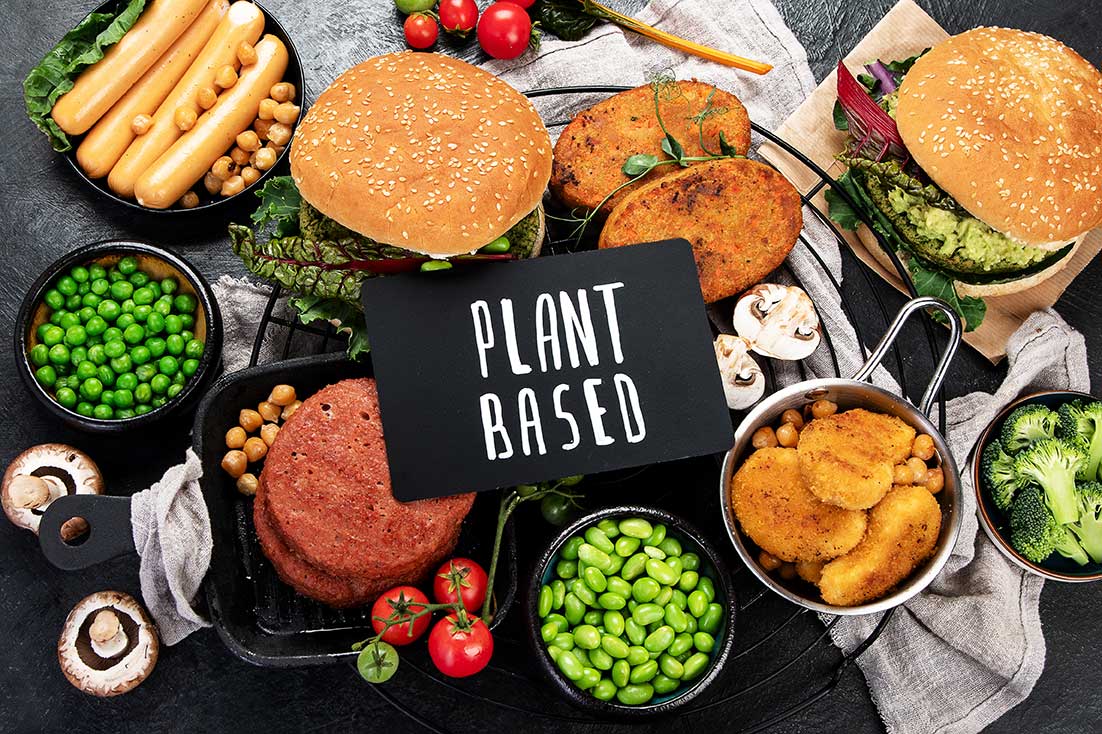Everything About Healthy And Balanced Food: Advantages of Taking On Plant Based Alternatives
The discussion bordering plant-based diets has actually acquired considerable interest in the last few years. Several people are checking out the possible health and wellness benefits, dietary benefits, and ecological effects associated with these nutritional selections. As people end up being a lot more familiar with their food's impact on well-being and sustainability, questions develop concerning the usefulness of taking on such a way of life. What certain modifications can one expect, and just how might these selections reshape not only personal health and wellness however additionally the earth's future?
Comprehending Plant-Based Diet Regimens
Many individuals connect plant-based diet plans mainly with vegetarianism or veganism, these diets can include a broad array of consuming patterns that focus on entire, minimally processed plant foods. Such diet regimens usually consist of fruits, veggies, whole grains, seeds, vegetables, and nuts, while limiting or eliminating pet items. This flexibility enables people to customize their nutritional options according to individual preferences and dietary demands. Some might embrace a largely plant-based diet plan while still occasionally consuming meat or dairy, frequently referred to as a flexitarian strategy. The focus stays on including more plant foods, which can result in a varied selection of tastes and dishes. Understanding these different analyses of plant-based eating is vital for valuing its accessibility and appeal in contemporary food society.
Health Advantages of Plant-Based Foods
The wellness advantages of plant-based foods are considerable, using a nutrient thickness advantage that supports total health. Study shows that these foods can boost heart health and wellness and play a crucial function in reliable weight monitoring. By integrating a lot more plant-based options, individuals might boost their dietary choices and promote long-term health.
Nutrient Thickness Advantage
Nutrient density plays a crucial function in the health advantages of plant-based foods, making them an engaging choice for those seeking a well balanced diet. Plant-based foods, such as fruits, veggies, vegetables, nuts, and entire grains, are typically abundant in vital vitamins, minerals, and anti-oxidants while being reduced in calories. This high nutrient thickness enables individuals to take in fewer calories while still meeting their nutritional needs. In addition, these foods are packed with nutritional fiber, advertising digestive system health and assisting in weight management. By incorporating nutrient-dense plant-based options, consumers can boost their overall wellness, sustain their body immune systems, and minimize the danger of persistent illness. Eventually, the nutrient density of plant-based foods emphasizes their value in a health-conscious lifestyle.
Heart Health Enhancement

Weight Management Assistance
In enhancement to promoting heart health and wellness, a plant-based diet can substantially assist in weight management. This nutritional technique stresses whole foods such as fruits, vegetables, vegetables, nuts, and whole grains, which are normally lower in calories and greater in fiber compared to animal-based items. The high fiber web content helps boost satiety, decreasing total calorie consumption. Plant-based diet regimens are usually abundant in necessary nutrients while reduced in unhealthy fats, making it simpler to maintain a healthy weight. Study shows that people that adopt a plant-based way of living tend to have reduced body mass indexes (BMIs) and experience more effective fat burning contrasted to those that eat meat-heavy diet regimens. Consequently, welcoming plant-based options is a strategic option for reliable weight management
Nutritional Value of Plant-Based Ingredients
Plant-based components are rich in crucial nutrients, supplying a varied variety of vitamins, minerals, and anti-oxidants that add to general health and wellness. A contrast of healthy protein sources discloses that while animal items are frequently deemed exceptional, lots of plant-based options provide adequate protein and various other useful compounds. Understanding the nutritional worth of these active ingredients can aid people make educated nutritional choices.
Essential Nutrients in Plants
Nutrient-rich ingredients discovered in plants provide a diverse range of vital minerals and vitamins that contribute significantly to total wellness. These components are abundant in vitamins A, C, and K, which support immune function, vision, and blood clot, respectively. Furthermore, plants offer essential minerals such as potassium, calcium, and magnesium, crucial for heart health, muscular tissue function, and bone toughness. The presence of fiber in plant-based foods aids food digestion and advertises a healthy digestive tract microbiome. Anti-oxidants, found generously in vegetables and fruits, aid battle oxidative anxiety and decrease inflammation. Many plant foods are reduced in calories yet high in nutrients, making them an excellent option for those looking for to keep a healthy and balanced weight while ensuring ideal nutrient consumption.

Comparing Protein Resources
Protein sources differ significantly in their dietary profiles, with plant-based active ingredients supplying distinct benefits. Unlike pet healthy proteins, which frequently include saturated fats and cholesterol, plant proteins tend to be lower in these harmful components. Legumes, nuts, seeds, and whole grains are abundant in essential amino acids, fiber, vitamins, and minerals. Lentils offer high protein web content together with considerable iron and folate, while quinoa is a full protein, supplying all 9 necessary amino acids. Furthermore, plant-based proteins are frequently accompanied by anti-oxidants and phytochemicals that sustain total wellness. The shift to plant-based healthy protein sources not just enhances nutritional consumption however likewise aligns with sustainable dietary methods, decreasing environmental impact and advertising long-lasting wellness advantages.
Ecological Influence of Plant-Based Consuming
As awareness of climate modification grows, several people are discovering sustainable nutritional options that can significantly lessen their ecological impact. Plant-based eating has actually become a substantial factor to reducing greenhouse gas emissions, which are primarily connected with livestock production. The cultivation of fruits, vegetables, grains, and veggies commonly calls for fewer sources, such as water and land, contrasted to animal farming. In addition, plant-based diets can cause lowered deforestation, as much less land is required for grazing livestock or growing pet feed. By changing towards plant-based options, customers can sustain biodiversity and advertise healthier communities. Overall, welcoming plant-based consuming not just benefits individual wellness yet additionally stands for an important step toward ecological sustainability and conservation efforts.
Overcoming Common Misconceptions
While several people identify the benefits of a plant-based diet, several misconceptions often discourage them from fully accepting this lifestyle. A find out common idea is that plant-based diets do not have enough healthy protein; nonetheless, countless plant sources, such as legumes, nuts, and tofu, offer ample healthy protein. Additionally, some assume that this diet is costly, navigate to this site when in reality, staples like beans, rice, and seasonal vegetables can be quite affordable. One more misunderstanding is that plant-based consuming is overly restrictive, whereas it really provides a diverse variety of foods and flavors. Lastly, several stress that a plant-based diet might cause deficiencies, yet with proper preparation, individuals can acquire all essential nutrients, consisting of minerals and vitamins, while appreciating a wide selection of delicious dishes.
Tips for Transitioning to a Plant-Based Way of life
Making the shift to a plant-based lifestyle can be an improving experience, though it often requires some assistance to browse the initial adjustments. Individuals are motivated to begin slowly, incorporating even more fruits, veggies, legumes, and entire grains into their meals while reducing meat and milk intake. Dish planning is vital; preparing an once a week menu can assist reduce the adjustment and avoid last-minute harmful choices. Checking out brand-new dishes and cooking techniques can additionally keep and enhance the experience enjoyment about plant-based consuming. Additionally, signing up with support system or communities can give inspiration and share important suggestions. Finally, staying informed regarding nutrition assurances well balanced dishes, stopping shortages while promoting a healthy, enjoyable plant-based way of living.
Delicious Plant-Based Meal Ideas
Exploring tasty plant-based dish concepts can influence people to embrace a more nutritious diet regimen. One preferred choice is a hearty quinoa salad, featuring cherry tomatoes, cucumber, and a zesty lemon-tahini dressing. An additional fave is a full-flavored lentil stew, packed with carrots, celery, and fragrant natural herbs, excellent for a comforting dinner. For morning meal, overnight oats made with almond milk, chia seeds, and topped with fresh berries supply a nourishing beginning to the day. In addition, a vibrant vegetable stir-fry with tofu and a variety of vivid veggies can be a quick yet pleasing meal. Creamy avocado salute on whole-grain bread, sprinkled with spices and seeds, uses an easy yet savory snack. These meals display the range and richness of plant-based eating.

Often Asked Concerns
Can a Plant-Based Diet Regimen Provide Sufficient Protein?
The concern of whether a plant-based diet can offer sufficient protein prevails. Various sources, consisting of vegetables, nuts, seeds, and whole grains, can fulfill healthy protein requires efficiently, sustaining a healthy and balanced diet for people.
Are Plant-Based Diet Plans Appropriate for Kid?
The suitability of plant-based diet plans for youngsters relies on careful planning. Sufficient nutrients have to be guaranteed, including healthy proteins, vitamins, and minerals. With proper advice, such diet regimens can sustain healthy growth and advancement in kids.
How Do I Eat in restaurants on a Plant-Based Diet regimen?
Eating in restaurants on a plant-based diet plan involves looking for resource restaurants with varied food selections, asking for adjustments, and exploring vegan-friendly choices. Planning in advance and communicating dietary preferences can boost the eating experience while preserving dietary choices.
What Prevail Allergens in Plant-Based Foods?
Typical irritants in plant-based foods consist of soy, gluten, nuts, and seeds - Plant Based Beef. Individuals following a plant-based diet plan ought to understand these irritants and review tags carefully to avoid damaging responses and assure risk-free consumption
Can Plant-Based Diets Aid With Weight Management?
Study suggests that taking on a plant-based diet plan might help with weight loss because of its generally reduced calorie density and higher fiber material. This mix can enhance satiety, helping people handle their caloric consumption efficiently. Lots of people link plant-based diet plans primarily with vegetarianism or veganism, these diet regimens can include a vast variety of consuming patterns that prioritize entire, minimally processed plant foods. Nutrient density plays an essential duty in the health advantages of plant-based foods, making them a compelling option for those looking for a balanced diet regimen. Plant-based diet regimens have actually been revealed to markedly boost heart health, as they typically include elements that sustain cardiovascular function. In addition to promoting heart wellness, a plant-based diet can considerably assist in weight management. An usual belief is that plant-based diet regimens do not have sufficient healthy protein; however, many plant resources, such as legumes, nuts, and tofu, provide sufficient healthy protein.